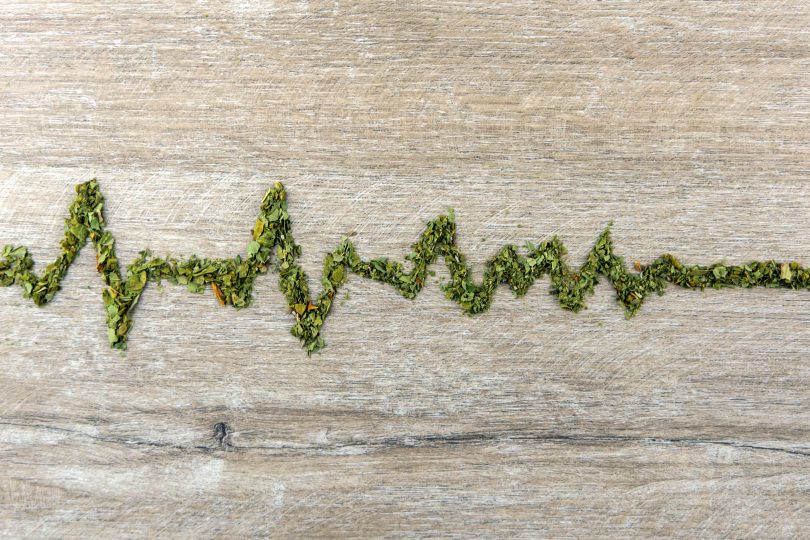*** Please note: This is an opinion piece, that mainly reflects the author’s opinion about this subject ***
If you don’t investigate for yourself what goes on in life, it’s easy to get swayed by a headline, without understanding why its there. In the case of cannabis, which is consistently linked with positive health benefits – including for heart heath, and a general lack of negative ones (especially of the deadly variety), there is a constant push by governments to have people think its unhealthy, even as these governments push pharmaceutical versions of the very same thing. The latest example? A study linking cannabis use with an increase risk of heart attacks, but is it true? Or just an example of bad press meant to push consumers toward pharmaceutical products?
There’s a lot of news that comes out about cannabis, and often it only comes out to force a belief on readers, like this recent study linking cannabis use with heart attacks. Luckily, there is plenty of good research out there to compare with, and a lot of great products available. From standard cannabis, to extracts like delta-8 THC, the benefits of cannabis can be accessed in different ways. We’ve got a great selection of delta-8 THC deals, along with many other compounds, such as thcv, thco, thcp, delta 10 and even hhc and hemp-derived delta 9 THC. So, make sure to do your own research when bad press comes out, and remember, your opinion is your own, and not for sale.
The study
The study was published on September 7th, 2021 in the publication, and is called: Open Access Recent cannabis use and myocardial infarction in young adults: a cross-sectional study. The goal of the study was to investigate recent cannabis use and history of myocardial infarction (heart attacks), in adults aged 18-44. This was not an in-person study, and all results were tabulated from existing information collected for other purposes.
It was done as a cross-sectional study off of collected data from 2017-2018 American Behavioral Risk Factor Surveillance System survey data. The study investigators analyzed any recent cannabis use, along with personal heart attack information, which was adjusted for socioeconomic issues, demographics, some substance abuse issues, behaviors related to general health, and other comorbid factors.
18.5 million respondent data was weighted, and 33,173 adult data was used. Of the 33,173, 4,610 (out of 3.2 million weighted), reported some amount of cannabis use in the form of smoking. It was found these participants had a higher frequency of myocardial infarction in comparison to those who had no use. The correlation was between those who use cannabis at least four times a month – only with smoking, not with other ingestion methods, and the incidence of heart attacks. I want to stress that again, it looked only at users who lit the plant on fire, and inhaled it, meaning we’re dealing with the issue of general smoking.

According to the study investigators, this study shows a relationship between recent cannabis use, and heart attacks, with the implication made that cannabis use for at-risk populations could pose a higher threat of heart attacks. The study authors did admit, in their ‘limitations’ section, that they weren’t able to collect data on the temporal relationship between when cannabis use started, and when heart issues started. Which means they couldn’t account for if cannabis use started before or after heart issues started. They also stated there are issues of missing data, but didn’t say what the missing data points were.
The study only measured some confounding factors (unrelated factors that could have caused the result), but not others, and left out some mighty important ones like cocaine, and other illicit drugs, some of which (like cocaine) are actually associated with causing heart problems. The study did not account for what the respondents were using in terms of cannabinoids, or if there were unregulated compounds with the cannabis. The authors used this last point to say that illegally obtained cannabis can be dangerous, but really, anything so much as sprayed with pesticides could pose a threat, so legally or illegally obtained makes no difference when it comes to unregulated and/or dangerous compounds with the cannabis.
The study did nothing to include data on cardiovascular confounding issues, meaning the investigators didn’t account for related cardiovascular issues in the person’s history, or family history. And nor did the study collect data about the specifics of the myocardial infarction issues being experienced, meaning a light heart attack and a cardiac arrest, would be looked at the same. They also gave not one mention to diet and exercise, and how these factors might effect heart attack risk, which we already know they do. Maybe most importantly, the study investigators completely left out the general issue of smoking (lighting something on fire and inhaling), which is one of the most well-known exacerbators of cardiovascular issues, regardless of what is being smoked.
It should also be noted, more than one study investigator has accepted money from multiple pharmaceutical companies, some of which put out cannabis products.
So, does cannabis increase the risk of heart attacks in young adults, or is this study bogus?
If cannabis really does cause an increase in risk for heart attacks among young adults, it certainly wasn’t identified by this study. I find it almost funny that this was peer-reviewed, because either the peer-reviewing system is fundamentally flawed, or that never actually happened here. I am truly dumbfounded by how incredibly off-the-mark this study is, although given that there is indirect pharmaceutical sponsorship, it does make sense, and this is seen quite often.
This is what’s called a smear campaign, or something put out to diminish the reputation of something, generally in order to push a competing factor. In this case, it seems the study is not only trying to create a connection that doesn’t exist to deter people from using non-pharmaceutical versions of cannabis, but actually attempts to make the argument that medical cannabis shouldn’t be used in at-risk patients, who have in actuality, benefited the most from it historically, whether pharmaceutical or illicit. Here’s why I say all this:

First and foremost, the study left out the biggest confounding issue: smoking. In fact, not only did the authors leave this out, but the study results actually suggests that smoking is the actual cause of the increase in heart attacks, as the only cannabis users in the study, were ones that smoked it. Considering they were looking at as little as four times of monthly use, the idea that it would be related to cannabis – which has no found history of myocardial relevance, and not smoking, which has been associated with up to 800,000 deaths a year from cardiovascular issues in the US alone, is sad at best, and horribly lacking in critical thought at worst. In fact, looking at the data, the only thing this study shows, is that there could be a connection between lighting something on fire and breathing it in, and having heart issues. But don’t we already know that??
The fact that the study authors didn’t look at substances used like cocaine, that they didn’t look at specifics of the heart issues being experienced, that they didn’t account for what came first, heart issues or cannabis use, that they didn’t look at whether the cannabis was tainted with pesticides (and examine how anything on the cannabis might effect heart issues), that they didn’t examine personal histories or family histories for heart issues, that they didn’t account for what kind of cannabis the person was smoking, that they didn’t take into account diet and exercise, that they didn’t account for other forms of cannabis ingestion, and that they didn’t account for smoking, all make this a shabby study at best, and disgustingly misleading at worst.
As far as I’m concerned, the study authors should be ashamed of themselves for publishing such a ridiculous piece of anti-research. You’d think these people didn’t have degrees at all. I mean, not accounting for the smoking factor? Where were these ‘professionals’ licensed? It seems quite likely this study was put out for the title value, since most people will not do what I did, and actually read through it. But go for it. It’s not too long, give it a read-thru, see how much sense it makes to you.
And then go down and look at the writers and who they have accepted money from in the past. Just Subodh Verma alone has accepted money from Boehringer Ingelheim (holds some of the strongest CBD patents), Eli Lilly (created cannabis treatment Nabilone), AstraZeneca (in agreements to develop CBD medications), Janssen (owns Canabo Medical Inc – cannabis health and wellness), Merck (a leading cannabis patent holder), Novartis (partnered with Tilray), Novo Nordisk (does consulting work with cannabis companies), Amgen, Sanofi (medical cannabis patent holder), Servier, Sun Pharmaceuticals, HLS Therapeutics, Amarin, Valeant (bought out Eli Lilly), Bayer (works with GW to market cannabis extracts), PhaseBio and Pfizer (one of the biggest holders of cannabis patents).
Another author, David Mazer, accepted money from Amgen, AstraZeneca, Boehringer Ingelheim and Octapharma. The latter did consulting work for these companies, the former has accepted research grants and speaking honoraria from the companies listed. I likely missed many connections, these were the obviously found ones, though many required some digging.
Just in case it needs to be said, none of these companies with cannabis products are looking to avoid use with at-risk populations. These medications are specifically made for them. However, it’s also common knowledge that pharmaceutical companies (and any company in the regulated market) lose money when people buy from the black market instead of their products, and is a probable reason a study like this was born. The impression I get is that companies which sell comparable products want you to only buy their products and be afraid of the natural plant. And if they don’t sell them, they want you to think cannabis will hurt you, and that you should buy their non-cannabis product instead. Either way, the natural plant is demonized, and the only answer given, is that if you’re not buying from a pharmaceutical company, you’re likely to die.

Can you see this in other places?
Yes, these smear campaigns are all the rage, but can usually be identified when looking at funding. When a government puts out direct medical information, it should be questioned because of conflicts of interest (the government takes money from large corporations after all, and this is not arguable). When a pharmaceutical company funds a study for which it sells the product in question, or a competing product, it should be questioned. Here are a few other recent smear campaigns against cannabis that have come up recently. Funny how these make an appearance as the medical information really solidifies around cannabis as a better overall answer to many of these company’s competing products.
- July 2021 study: Development Over Time of the Population-Attributable Risk Fraction for Cannabis Use Disorder in Schizophrenia in Denmark. This study tried to tie problematic marijuana use to schizophrenia. The problem with such an assertion is that global numbers for schizophrenia have stayed consistent, and as a disorder with no medical definition, every diagnosis and study is based off of subjective information, making for no hard info. Plus, this was taken from data used in other places, did not account for much confounding information, comes from a country that has very anti-cannabis laws, and had so many holes in it, you could drive a truck through. And then there’s the fact it was 100% funded by Lundbeckfonden, a pharmaceutical company, making for the biggest conflict of interest of all.
- Then there’s this study from June, 2021, Impaired awareness: Why people with multiple sclerosis continue using cannabis despite evidence to the contrary. The study tried to show how MS sufferers use cannabis despite it showing cognitive impairment in the short term. The only thing the study did back up, was that cannabis only does cause impairment in the short term, and that impairment not only goes away quickly with cessation of use, but that its still preferable to MS patients so long as their symptoms can be dealt with, which is hardly a detraction of cannabis at all. Of course, lead author Anthony Feinstein, has accepted funds from multiple pharmaceutical companies, which is probably why it seems the results were molded to look negative for cannabis, when further investigation shows otherwise.
- And what about this study linking cannabis to suicide: Associations of Suicidality Trends With Cannabis Use as a Function of Sex and Depression Status? The study used information from the National Surveys on Drug Use and Health collected between 2008 and 2019, in which the respondents had answered questions (out of context) about cannabis use, depression, major depressive episodes, suicidal thoughts, plans, and attempts. This information was adjusted for sociodemographic issues, nicotine use, alcohol use disorder, and cocaine use, but nothing else. The investigators didn’t even factor in prescription medications and illicit drug use other than cocaine, even though prescription drug misuse is significantly higher than cocaine abuse. The investigators made a connection between even small amounts of cannabis use and suicide, which just isn’t backed up by life in general. It’s easy to forget that cannabis has been used for millennia, and somehow, suicide never came up. Of course, at least one study author accepted pharma money, and this is a 100% government-funded study. Big pharma gives an average of $233 million a year to politicians in the US government, meaning government-funded can be considered pharmaceutically-funded!
Conclusion
Does cannabis cause an increase in the risk of heart attacks for young adults? Well, if it does, this probably would have come up in the thousands of years that cannabis has been used medicinally, and surprise!, it didn’t until the pharmaceutical industry became threatened by the illicit cannabis industry. The study shows that smoking itself may increase risks of heart attack, but that’s old news already. If cannabis has any effect on heart attack risk, this study certainly didn’t find it. And those who both worked on it, and peer-reviewed it, should be embarrassed and ashamed of what they put out.
Hello all! Welcome to CBDtesters.co, the #1 internet location for the most thought-provoking and current cannabis and psychedelics-related news from around the world. Drop by for a visit regularly to stay on top of the quickly-moving universe of legal drugs and industrial hemp, and sign up to be a part of our newsletter list, to ensure you always know what’s going on.
Disclaimer: Hi, I’m a researcher and writer. I’m not a doctor, lawyer, or businessperson. All information in my articles is sourced and referenced, and all opinions stated are mine. I am not giving anyone advise, and though I am more than happy to discuss topics, should someone have a further question or concern, they should seek guidance from a relevant professional.

